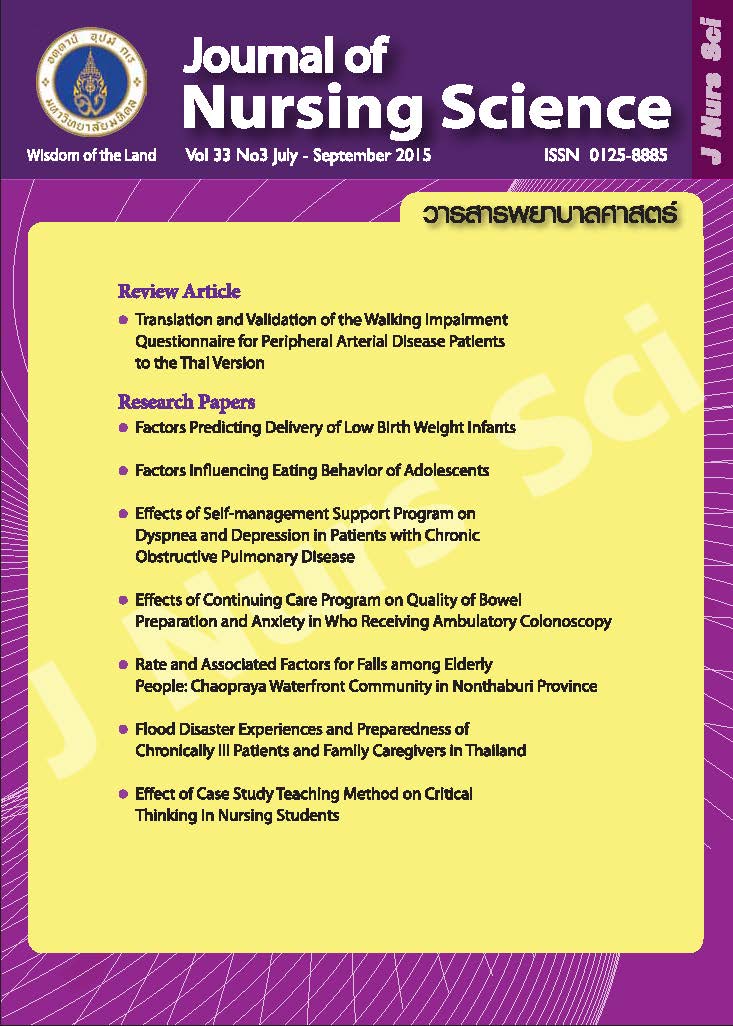Effects of Continuing Care Program on Quality of Bowel Preparation and Anxiety in Who Receiving Ambulatory Colonoscopy
Main Article Content
Abstract
Purpose: To investigate effects of continuing care program on quality of bowel preparation and anxiety in patients receiving ambulatory colonoscopy.
Design: Quasi-experimental research design.
Methods: The study sample consisted of 83 patients who had an appointment to undergo ambulatory colonoscopy at Siriraj Hospital. Forty-one were assigned into the control group, while 42 were assigned into the experimental group. The control group received routine care, whereas the experimental group received the continuing care program consisting of care on the day of making an appointment, care during the examination, and care before hospital discharge. Data were collected using personal data record form, cleanliness of bowel preparation record form, and numerical anxiety scale. Data were analyzed by using descriptive statistics, independent t-test and paired t-test.
Main findings: The mean score of bowel preparation quality of the experimental group was higher than that of the control group, with statistical significance (p = .03). The mean score of anxiety of the experimental group obtained on the day before undergoing ambulatory colonoscopy was lower than that obtained on the day the appointment, with statistical significance (p = .02) but the control group was not significantly (p = .23). However, when comparing the mean scores of anxiety of patients between groups, it was found that there were no statistically significant differences on the day of making appointment (p = .94) and the day before undergoing ambulatory colonoscopy (p = .49).
Conclusion and recommendations: Based on the study findings, it is recommended that the continuing care program can be used to increase the quality of bowel preparation in patients receiving ambulatory colonoscopy.
ผลของโปรแกรมการดูแลต่อเนื่องต่อคุณภาพของการเตรียมลำไส้ และความวิตกกังวลในผู้ที่เข้ารับการส่องกล้องลำไส้ใหญ่และทวารหนักแบบผู้ป่วยนอก
บทคัดย่อ
วัตถุประสงค์: เพื่อศึกษาผลของการใช้โปรแกรมการดูแลต่อเนื่องต่อคุณภาพการเตรียมลำไส้และความวิตกกังวลในผู้ที่เข้ารับการส่องกล้องลำไส้ใหญ่และทวารหนักแบบผู้ป่วยนอก
รูปแบบการวิจัย: เป็นการวิจัยกึ่งทดลอง
วิธีดำเนินการวิจัย: กลุ่มตัวอย่างเป็นผู้ที่เข้ารับการนัดหมายเพื่อทำการส่องกล้องลำไส้ใหญ่และทวารหนักแบบผู้ป่วยนอก ณ โรงพยาบาลศิริราช โดยแบ่งเป็นกลุ่มควบคุม 41 ราย ได้รับการดูแลตามปกติและกลุ่มทดลอง 42 ราย ได้รับโปรแกรมการดูแลต่อเนื่อง ประกอบด้วยการดูแลในระยะวันมารับการนัดหมาย ระยะเข้ารับการตรวจและระยะเตรียมการจำหน่ายก่อนกลับบ้าน เก็บรวบรวมข้อมูลโดยใช้แบบบันทึกข้อมูลส่วนบุคคล แบบบันทึกความสะอาดของการเตรียมลำไส้และแบบประเมินความวิตกกังวลแบบตัวเลข วิเคราะห์ข้อมูล โดยใช้สถิติ paired t-test, Independent t-test
ผลการวิจัย: ค่าเฉลี่ยของคุณภาพของการเตรียมลำไส้ใหญ่ในกลุ่มทดลองมากกว่ากลุ่มควบคุมอย่างมีนัยสำคัญทางสถิติ (p = .03) กลุ่มทดลองมีค่าเฉลี่ยความวิตกกังวลในวันก่อนเข้ารับการส่องกล้องน้อยกว่าวันมารับการนัดหมายอย่างมีนัยสำคัญทางสถิติ (p = .02) แต่ในกลุ่มควบคุม ค่าเฉลี่ยความวิตกกังวลในวันก่อนเข้ารับการส่องกล้องลำไส้ใหญ่และทวารหนักน้อยกว่าวันมารับการนัดหมายอย่างไม่มีนัยสำคัญทางสถิติ (p = .23) อย่างไรก็ตามเมื่อเปรียบเทียบค่าเฉลี่ยคะแนนความวิตกกังวลระหว่างกลุ่มทดลองและกลุ่มควบคุมในวันมารับการนัดหมายและก่อนเข้ารับการส่องกล้อง กลุ่มตัวอย่างทั้ง 2 กลุ่ม พบว่าไม่มีความแตกต่างกันอย่างมีนัยสำคัญทางสถิติทั้งวันมารับการนัดหมาย (p = .94) และก่อนเข้ารับการส่องกล้อง (p = .49)
สรุปและข้อเสนอแนะ: สามารถนำไปใช้เพื่อเพิ่มคุณภาพของการเตรียมลำไส้ใหญ่ในผู้ที่เข้ารับการส่องกล้องลำไส้ใหญ่และทวารหนักแบบผู้ป่วยนอกได้
คำสำคัญ: การส่องกล้องใหญ่และทวารหนัก การดูแลต่อเนื่อง การเตรียมลำไส้ใหญ่ ความวิตกกังวล
Article Details
Copyright Notice: Nursing Science Journal of Thailand has exclusive rights to publish and distribute the manuscript and all contents therein. Without the journal’s permission, the dissemination of the manuscript in another journal or online, and the reproduction of the manuscript for non-educational purpose are prohibited.

Disclaimer: The opinion expressed and figures provided in this journal, NSJT, are the sole responsibility of the authors. The editorial board bears no responsibility in this regard.


